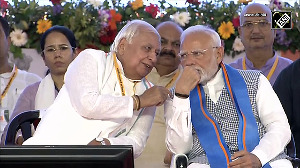Even as the United States Senate has scheduled a quick hearing on the India-US nuclear deal, all eyes are on the House of Representatives whose Foreign Affairs Committee Chairman Howard Berman, a vocal critic of the pact, is yet to take a call on having a similar process.
Body blow to nuclear disarmament
"Secretary of State Condoleezza Rice has been lobbying furiously for the India deal, which appears to hinge on whether the White House can persuade Republican Howard Berman, chairman of the House Foreign Affairs Committee, to agree to waive a 30-day waiting period before Congress can vote on it," the influential Washington Post reported on Monday.
The Senate Foreign Relations Committee has scheduled a hearing for September 18 featuring the Under Secretary of State for Political Affairs William Burns, but the House Foreign Affairs Committee led by Berman has not scheduled anything yet.
Why China did what it did at NSG
The Post noted that the Indo-US nuclear deal was vying with three bilateral trade pacts with Panama, South Korea and Columbia in the 110th Congress, which has listed them among its unfinished businesses.
"But with two weeks left before Congress heads out on recess, a number of Bush initiatives are still unapproved. Most notable are three free trade pacts and the civil nuclear deal with India that has been a linchpin of the administration's hopes of forging even closer ties with the world's largest democracy," The Post's 'In The Loop' column has said.
'What does the BJP want to achieve'
Sources maintain that the Bush administration is banking primarily on a three-pronged strategy to get Congressional support for the nuclear deal.
It is relying on its own lobbying weight in the House of Representatives and in the Senate especially with key Congressional players.
'The people of India are for nuclear deal'
The administration is banking on the power of the business lobby on Capitol Hill by highlighting the fact that as much as $100 billion by way of nuclear trade over the decade is on the line for American business houses and time cannot be lost.
The administration is also impressing upon the Indian American community that it would have to do its part -- as it very well did -- in 2006 in the run up to the passage of the Hyde Act.
Political implications of the NSG waiver
It is expected that this week the legislative process could be unfolding although even law makers are unsure of how this is going to come up.
"I don't think anybody knows what is going to happen," quipped the Democratic Co Chair of the Congressional Caucus on India and Indian Americans, Jim McDermott, at a recent meeting of the United States India Business Alliance on Capitol Hill.
NSG: Do not discard the baby with the bath water
One view is that the 13-member Rules Committee of the House will have to first agree to change the 30-day requirement although some others seem to be under the impression that the US-India civilian nuclear deal can be brought to the floor without involving the Rules Committee-- how this can happen has not been explained.
The technicalities aside, the Bush administration has always been speaking of the civilian nuclear deal as being an initiative that has the 'solid bi-partisan' backing.
India has got the best possible agreement
It is also being pointed out that the powerful Speaker of the House-- Nancy Pelosi -- backs the deal and the same goes for Senate Majority Leader Harry Reid.
Even if the White House is not taking any chances in the House or any law maker for granted there, it is said to be attaching a great deal of importance to the Senate where just one Senator can hold up the process, given that Chamber's Unanimous Consent rule. Twelve Democrats, many of them in-charge of different powerful panels, had voted against the Hyde Act in 2006 in the Senate.
'It is sad N-deal is smeared in dirty politics'
Commenting on the emerging scenario, a senior Indian American community leader maintained that everyone understands that the Senate approval is 'trickier' than the House given the rule of "Unanimous Consent" and hence the message to Senators who had voted against the deal will be different -- "You may be against the civilian nuclear deal and may have voted against it, but please don't stand in the way of the agreement moving forward".






